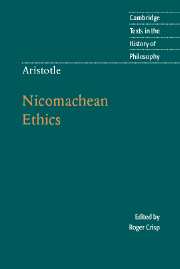Book V
from Nicomachean Ethics
Summary
We must consider justice and injustice – what sort of actions they are concerned with, what kind of mean justice is, and what are the extremes between which the just is a mean. Let our inquiry be conducted in the same way as our preceding discussions.
We see that everyone means by justice the same kind of state, namely, that which disposes people to do just actions, act justly, and wish for what is just. In the same way, by injustice they mean the state that makes people act unjustly and wish for what is unjust. So let us too begin with these assumptions as a rough basis for our discussion.
What is true of sciences and capacities is not true of states, since it seems that contraries can both be the concern of the same capacity or science, while a state does not produce results contrary to itself. For example, as a result of health, we do not do actions contrary to health, but only those that are healthy; we say that we are walking healthily when we walk as a healthy person would.
One can often identify a contrary state from its contrary, and states from their subjects. If it is clear what the good state is, then the bad state also becomes clear, and the good state is identified from the things that are in that state, and they from it: if the good state is firmness of flesh, then the bad state must be flabbiness, and what conduces to the good state must be what produces firmness of flesh.
- Type
- Chapter
- Information
- Aristotle: Nicomachean Ethics , pp. 81 - 102Publisher: Cambridge University PressPrint publication year: 2000



